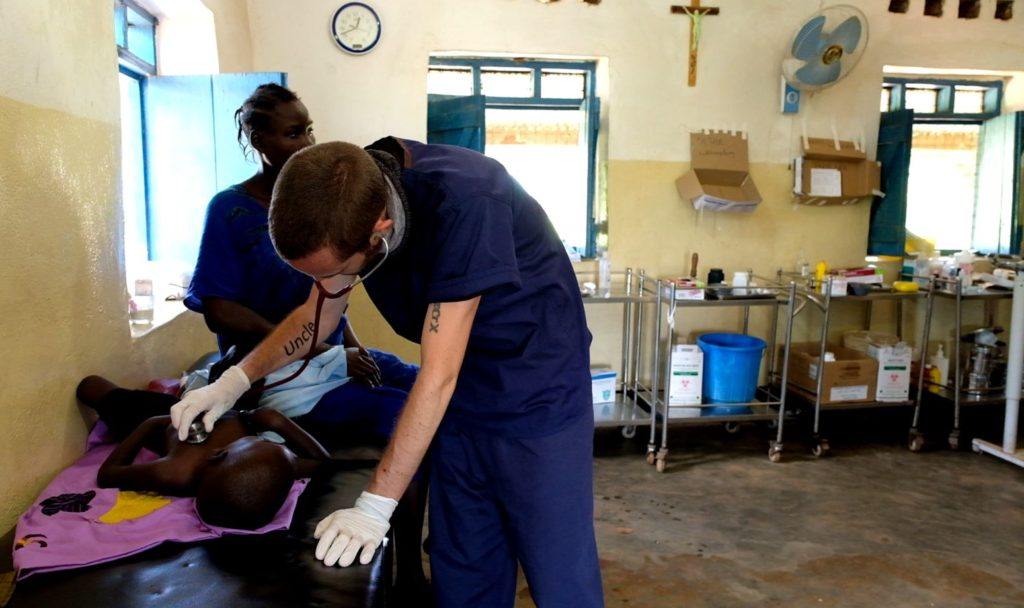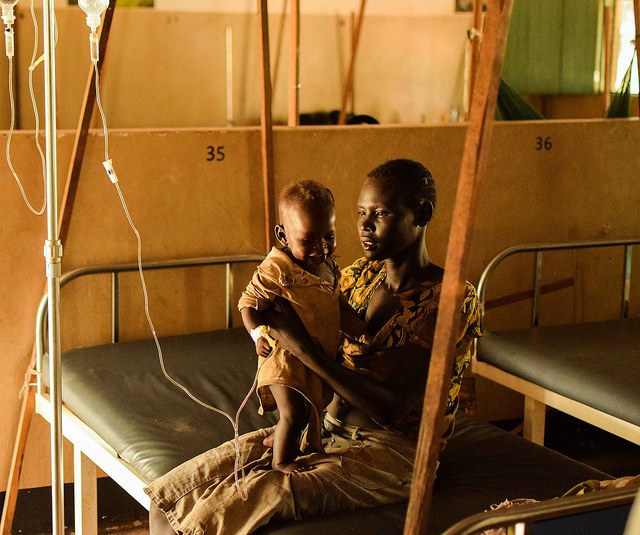Oliver: A Tale With A Twist
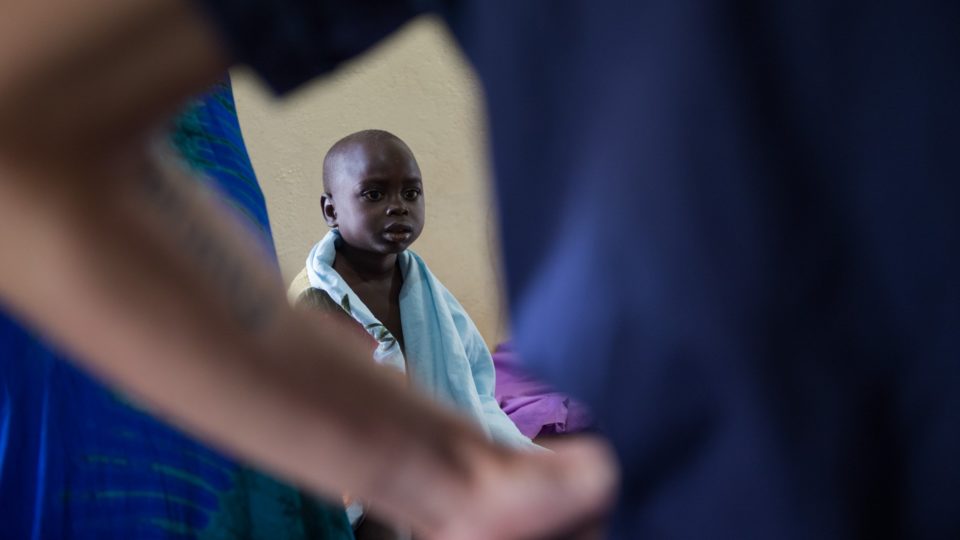
Dr. Matthew Jones is an international volunteer serving at St. Theresa Hospital in Nzara, South Sudan. Here he shares the story of an encounter with one child, Oliver.
The first time I met Oliver, I didn’t notice Oliver. He was one of 40 children on the pediatric ward round I undertake on a daily basis. When you see 40 young children a day, it’s hard to remember names and faces; the ward reaches 30 degrees by midday and it’s a race against time, not a voyage of personal connection.
How can you really get a sense of their body, mind, and personality? It’s a wailing wall, a tumultuous tide; 40 variants on the theme of childhood illness, diarrhea, vomiting, fever, and poor appetite.
So, the first time I met Oliver, I vaguely recall a slight impatience that this little boy didn’t quite recover from malaria as quickly as the children around him. But he was a sweet little boy and we soon discharged him on his way home and out of our lives.
The curious thing here is how easily you forget the children you see over the course of four or five days and nurse to good health. Within a day, no matter how interesting the medical case, the unusual symptoms, the curious features, the names are gone, the briefest goodbye, and back into the jungle the mother and child returns, back to the life they lead of which I have no understanding or knowledge.
Beyond this corridor, a corridor between the hospital and the guesthouse where I live, a corridor between outpatients and the wards, these corridors where worlds meet and intermingle, their lives and mine have no overlap. They live in small, brick and straw huts, where the only electricity are the strikes from the sky and the only network is the myriad paths cut by sheer number of ants across red dirt tracks and paths. And the Olivers of my life, these fragile children crying or mute, fearful of me or utterly impassive, usually disappear down the end of the corridor and out of sight forever.
But a day after discharge, Oliver is back. When I arrive at work the following day, a boy is bundled up against his mother, swaddled, held tight, just a face and neck visible, gasping for breath and glassy eyed. It takes little experience to know that Oliver is suffering from a profound anemia at this point, a seemingly sudden crash in his hemoglobin levels bringing him close to the edge of the cliff, the drop below into the dark, frothing waves.
The ward staff had failed to get a line into his arms or legs; the air is fetid with hopelessness, the agonal heaving of chest, the eyelids slate grey. I do what I can do, I take Oliver and his mother away from the crowd, the milling bodies, sensing perhaps the oft repeated drama of grieving mother.
Death has no private meaning here, the theatre, the spectacle, the audience. But we can at least give this little delicate soul a dignified end; that deep wish to pull a cloak over our suffering selves. I take him and his mother, heavily pregnant, and a member of staff to our procedure room, to try the more desperate measures whose brutality might shock and fascinate the crowd.
And in that hot procedure room, we remain for over 2 hours, as I place a succession of lines into Oliver’s body, each failing in turn, the legs, the groin, the neck. Though the blood arrives from the hurried donation by Oliver’s father, it sits there above our heads as I feel a creeping despair. Briefly, it begins to run, agonising drop by drop, into a vein in his neck. But though his mother and I will on each drop, it slows, it dawdles, it delays, and then it stops.
I stand back; the ultrasound machine, that incongruous member of a ward whose other fixtures include columns of ants, flaking paintwork, and walls stained deeply and irrevocably by the red dust of this land, has stopped working after a brief promise of hope. We don’t have a power cable that fits adequately, so this donation from abroad is nothing more than an expensive doorstop on the floor holding open the door to bring in precious fresh air.
The curiosity of working as a doctor here is the low expectation; the sense of fate that pervades the hospital, a default mortality and failure, the team so often mere witnesses to the final acts of lives whose passing mostly occurred in the months in the bush without medical care and attention. And as I watched Oliver, breathing desperately, how easy it was to overlay his life with the final moments of others, those children who arrive too late, with malnutrition, anaemia and malaria. It’s not to give up, nor despair, but simply to find comfort in our inability to do little but stem the flow.
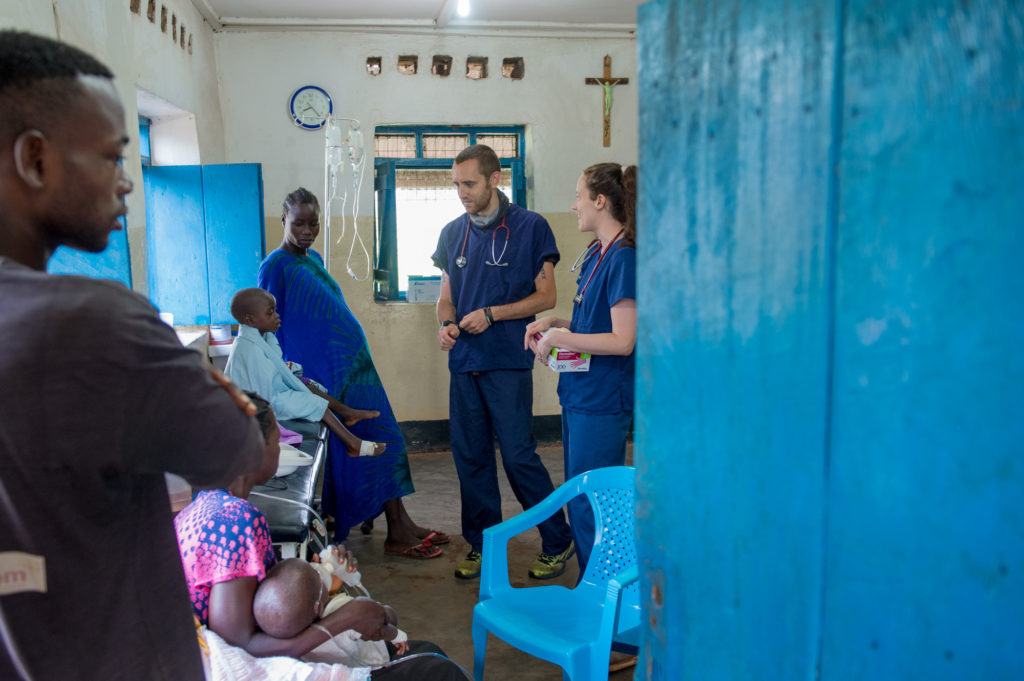
Dr. Matthew Jones stands talking with Oliver and his mom in the procedure room at St. Theresa Hospital in South Sudan
You don’t want to experiment, to try your luck when all options are gone; sometimes, you have to accept your limits and allow a life to pass with dignity. But with a boy, so young, so loved, so pure, you can’t help but want to pound the ground; beat his chest into life. And so, I take a needle, clean the skin and push with all my might, forcing the needle slowly at first into his shin bone. A gesture both brutal and imploring; his mother unusually doesn’t turn away as mothers often do in these moments. After 2 hours, perhaps I’ve gained a little trust.
The needle bends at one point; it feels like it’s lodged in the hard exterior of the bone; and then the bone yields. And seemingly miraculously when connected to the bag of blood, it drips. Slowly at first, then steadily; something in the air has changed, I suddenly know he will be ok. A wave of relief, the tension gone.
The days of his life are precious. And I am grateful for having shared one day with him, one day of despair and then relief. It means so little but so much. – Dr. Matthew
I think a lot about charity here; what it means to do ‘good’, sometimes whether there’s any point when it seems like a small drop of blood in a frothing, stormy ocean. Every day new challenges rise up before you, the respite and relief of the day before so brief. The temptation to be swallowed by the place, dragged willingly into the bush, over the fragile edge from civilization to jungle, to give up and allow nature to rule. Charity is not sustainable; any more than any act of goodness or kindness. It is washed away quickly and leaves little trace. Every good deed here is counterbalanced by a life, a limb, a love, clawed back by the jungle.
But in such thoughts, in such moments, in the lives of Oliver and every Oliver out there, I find solace. Charity is a single good deed and then gone; but in such deeds we save the world as we know it for another day.
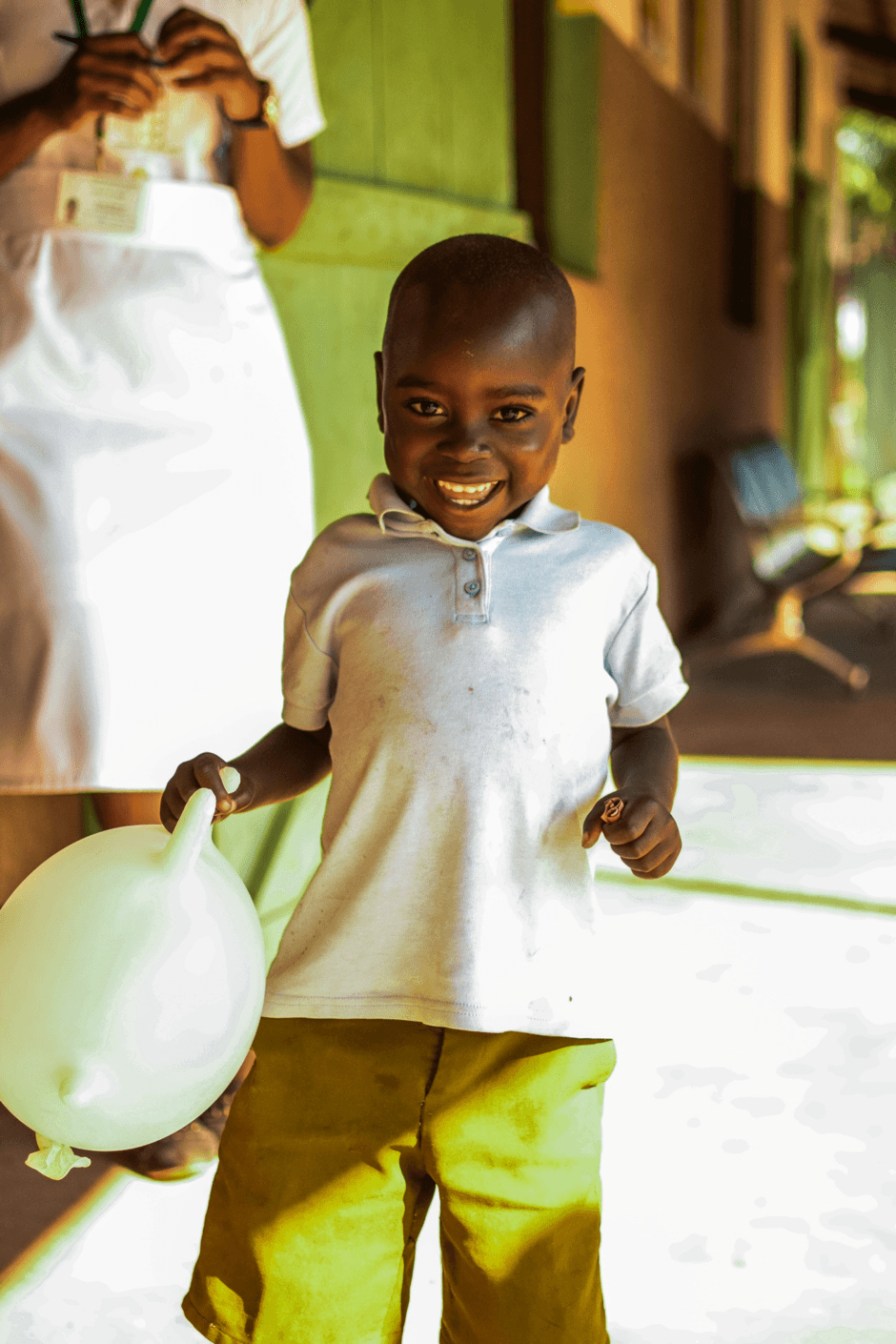
Oliver leaves the hospital with a big smile and blown up hospital glove!
Oliver went home four days later with a balloon in his hand. A glove, a medical glove, blown up the ward staff. A smile on his face, back into the bush, with his mother by his side. There are two worlds now in my head, one with Oliver and one without. They are pretty similar on the outside, but to his mother, they are worlds apart.
Whatever happens to him from now, the days of his life are precious. And I am grateful for having shared one day with him, one day of despair and then relief. It means so little but so much.
